
|
January 30, 2018
NTD Interview
|
|

|
January 16, 2018
CNN Interview - Part 1
|

|
January 16, 2018
CNN Interview - Part 2
|
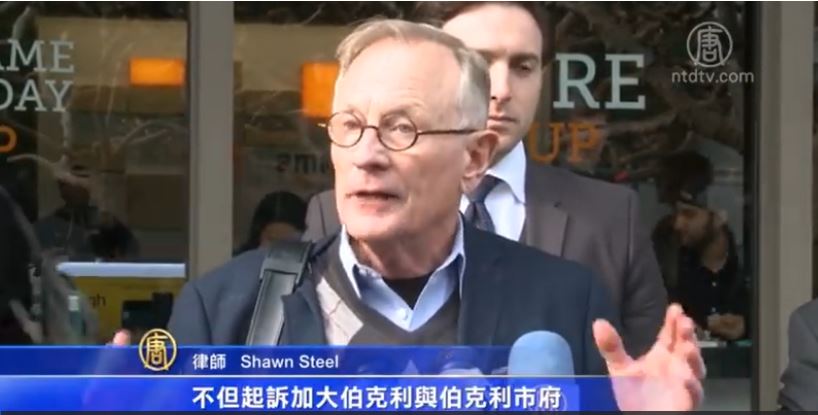
|
January 16, 2018
Press Conference
|
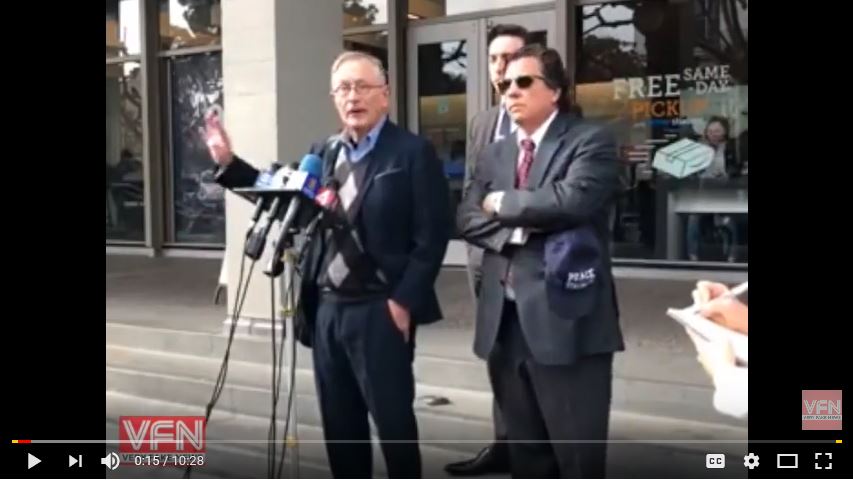
|
January 16, 2018
Press Conference
|

|
October 24, 2017
CNN Interview
|

|
October 18, 2017
CNN Interview
|
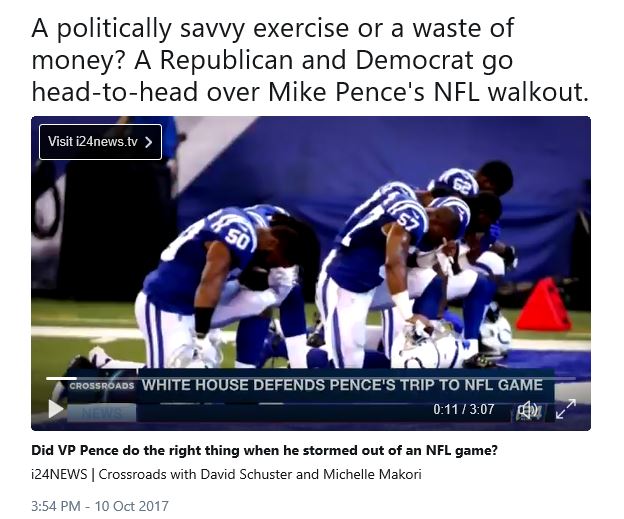
|
October 10, 2017
i24News Interview
|

|
October 6, 2017
The Epoch Times Interview
|
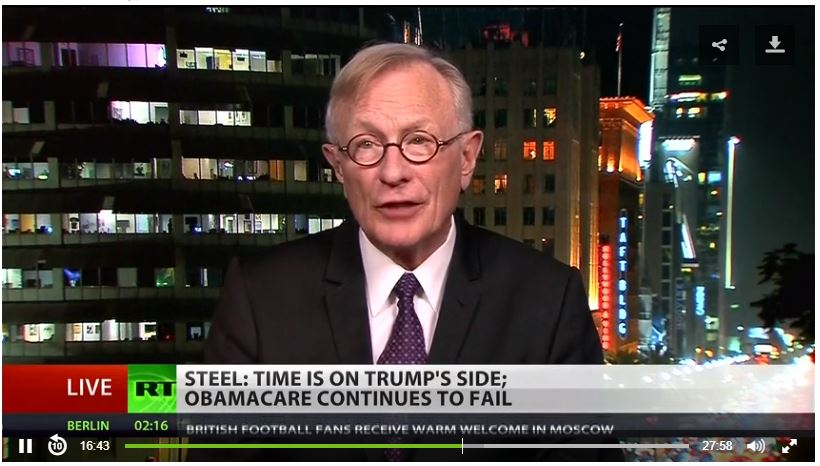
|
September 27, 2017
RT America Interview
|
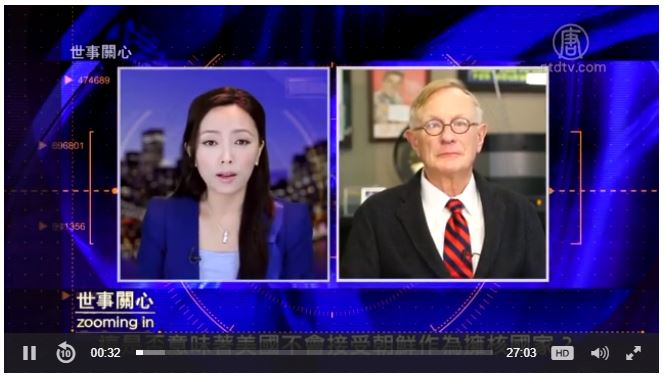
|
September 26, 2017
NTD Interview
|
|
|
|
|
|
|
|

Pence tours California, raises funds for House Republicans
October 09, 2017
Vice President Mike Pence traveled up California on Monday to raise money for endangered Republican congressional candidates and tout the Trump administration's proposal for cutting taxes.
It was the first visit to the heavily Democratic state by a member of the Trump-Pence ticket since the November election, when Democrat Hillary Clinton won the state by more than 4 million votes. Pence jetted from a Southern California fundraiser costing $2,700 for lunch at a luxury resort to Northern California for a hotel dinner in Sacramento alongside U.S. House Majority Leader Kevin McCarthy.
In between, he toured a small manufacturing company just outside of the capital to promote a tax plan he said would ease filing for 90 percent of families and lower taxes for small businesses.
He predicted an improved economy would help Republican candidates hold their ground in California and promised quick action on tax reform. The plan would, among other things, lower the corporate tax rate to 20 percent and raise the standard deduction, Pence said.
"We're going to get this done, and we're going to get this done this year," he said, making no mention of President Donald Trump's struggle to see other priorities such as health care reform pass through Congress.
Pence deviated little from the topics at hand, making no mention at the business tour of the president's recent spat with GOP Sen. Bob Corker of Tennessee or his own decision to leave an NFL game on Sunday when players kneeled during the national anthem. He did, though, pledge federal assistance as Northern California battles deadly wire fires near the Napa and Sonoma wine countries, although it was unclear if he was promising to answer Gov. Jerry Brown's request for a federal disaster declaration.
"We'll be working very closely with Gov. Brown and California to see you through these challenging times," Pence said.
Pence arrived Sunday in Los Angeles for a three-day swing through the state, and he'll head back to Southern California on Tuesday.
California has long been a source of campaign dollars for both major political parties. Pence's money-raising efforts were aimed at boosting Republicans, who are seen as key targets in the Democrats quest to retake the U.S. House of Representatives in 2018.
Democrats are targeting seven California Republicans who hold seats in districts carried by Clinton in last year's presidential campaign. Clinton trounced Trump in the strongly Democratic state, and Democrats are hoping opposition to the president's environmental, immigration and health care policies in California will drive voters to the polls next year.
Several of those competitive seats are in Orange County, once a Republican fortress where Democrats have been steadily increasing their numbers.
House members who attended the Newport Beach fundraiser included Reps. Darrell Issa, Mimi Walters, Dana Rohrabacher and Ed Royce, said Republican National Committeeman Shawn Steel, who hosted the event.
Republicans "want to build a firewall" in California, undercutting Democratic chances of retaking the House in 2018, Steel said.
"The Democrats think that they have an opportunity in California. It's a bad bet," Steel added.
California has waged repeated battles against the Trump administration this year, particularly on immigration and the environment. State Attorney General Xavier Becerra, a former member of Congress, has sued over the administration's numerous attempts to roll back environmental regulations and last week Brown signed legislation that limits the ability of California police to cooperate with federal immigration authorities.

Charlottesville and the ongoing threat of the alt-right
September 21, 2017
Charlottesville will be remembered as an ugly scar on American life. “Racism is real,” Republican Sen. Tim Scott of South Carolina put it bluntly after a white supremacist terrorist drove his car into a crowd of peaceful demonstrators. “It is alive. It is here.” A month later, it’s still here. Evil isn’t defeated by temporarily changing our profile picture or tweeting 140 characters of hollow solidarity under #Charlottesville. It requires a sustained and disciplined effort to confront racism in our daily lives — when we see it expressed among our friends or neighbors — and especially when it rears its ugliness in any political capacity. “Racism and hatred have no place in the conservative movement. Full stop,” writes Townhall columnist Jason Pye. The uncomfortable reality is that, at one time or another, both major political parties have provided aid and comfort to national socialists and white supremacists. At its peak in the 1920s, the Ku Klux Klan’s 4 million members included prominent Southern Democratic judges and elected officials at every level of government. Perhaps most infamously, the late Democratic Sen. Robert Byrd of West Virginia founded a KKK chapter on his way to achieving the Klan’s rank of “Exalted Cyclops.” The roles have been reversed today, as “white power” extremists rally under the “Unite the Right” banner. This ideological evolution is difficult to explain if you make the mistake of considering it to be a legitimate political movement. “The angry white boys do not have a serious political agenda,” National Review’s Kevin D. Williamson explains. “Their agenda is their anger, an anger that is difficult to understand.” As further proof of this anger-driven agenda, look no further than the fascinating evolution of one agent provocateur: Jason Kessler. The self-proclaimed “pro-white” activist found a home in white supremacy only after serving as a Wall Street Occupier and backing President Obama, according to the left-wing Southern Poverty Law Center. Conservatives and libertarians must be alert to what happened in Charlottesville. Ignoring the alt-right will leave a deep and permanent scar on the conservative movement. We can’t offer moral equivocations or excuses, either. “They are the wolves in sheep clothing looking to draw more and more people into their pack, while ripping away at the foundation of freedom and liberty at the same time,” warns Hot Air’s Taylor Millard. There’s space for nearly everyone in the Republican Party. Our movement is united by freedom for the individual from government oppression. You can be a dreadlocked homeless activist, or a buttoned-up college Republican. However, you can’t be a white supremacist or an alt-right fascist. We’ve been here once before. The founder of modern conservativism, William F. Buckley Jr., who started National Review in the 1950s, exposed anti-Semitism on the right — and excised it entirely. This old story must be replayed to face the new threat. Republican organizations, large and small, must actively identify white supremacists, Nazis, Ku Klux Klan members and any other alt-right extremists within our ranks, and forcibly exorcise them from the conservative movement. Don’t expect this to happen overnight. “Anyone that expects an epiphany or a transformation to happen overnight because somebody walks in a room, I think, you don’t understand human nature,” said Mr. Scott, the first African American senator to win election in the South since Reconstruction. The domestic terrorist attack in Charlottesville is quickly fading from the headlines, but the real work to stamp out its “white power” origins is only just beginning. Alt-right, white supremacist followers should never be tolerated by conservatives.

Vice President Mike Pence postpones Newport Beach fundraiser
September 12, 2017
By MARTIN WISCKOL Vice President Mike Pence is postponing four fundraisers planned in California — including a Friday luncheon in Newport Beach and a Thursday dinner in Beverly Hills — so he can travel to Florida in response to Hurricane Irma. Pence is expected to reschedule the events for early October, according Republican National Committeeman Shawn Steel, a Surfside resident. The events were to raise money for the GOP’s defense of vulnerable Republican Congress members in California. Six of those targeted by Democrats are from Southern California: Darrell Issa, R-Vista; Dana Rohrabacher, R-Costa Mesa; Mimi Walters, R-Laguna Beach; Ed Royce, R-Fullerton; Steve Knight, R-Palmdale; and Duncan Hunter, R-Lakeside. Anti-Trump activists had been planning to demonstrate outside the Newport Beach and Beverly Hills fundraisers, including Ladera Ranch’s Taran Singh Brar and the inflatable Chicken Don balloon that attracted worldwide attention when Brar displayed it near the White House last month.

Timely acts of kindness, a specious debate over levees and Delta tunnels
September 10, 2017
Restoring hope
Re “ Take Two: Thoughts, prayers, rescues, attacks and apologies” (sacbee,.com, Sept. 3): These days there is a surfeit of things to worry about. Regardless of who we are, where we live, whom we love or what we believe, we can all rest assured that this life presents plenty of challenges. After the events of Charlottesville, I had a burgeoning sense that our country was on a meandering, yet certain path to something akin to civil war. But then two things happened. The first, Hurricane Harvey. I never thought I would compliment the state of Texas, yet here it is: Texas, you have renewed my belief that there exists a relenting goodness in most of us. The second, Dan Morain’s apology to Harmeet Dhillon. Just when apologies seemed to be a dusty remnant of some bygone era, here comes The Bee’s editorial page editor with a sincere apology for his choice of words. I plan to share his words with my fifth-graders as an example of compassion, reflection and emotional intelligence. Thank you, for restoring some of my lost hope.
Angela F. Luna,
Sacramento

Skeptics may lecture, but California high-speed rail is already proving them wrong
September 07, 2017
By Dan Richard All one needs to do is drive State Route 99 through the Central Valley to know that Shawn Steel’s editorial indicating that California’s high-speed rail project has “ broken more promises than ground” is wrong. The nation’s first high-speed rail program has more than 119 miles under construction, and more than $3 billion invested in California’s economy. Steel wants to lecture us on the theory of sunk cost. Our business-oriented board of directors was fully prepared to tell the governor and the Legislature not to go forward if the project didn’t make economic sense. Despite the cost increases, our assessment was that high-speed rail would still be able to operate without a subsidy and more cheaply than alternatives of more highways and airports.

Steel and others who call for government to operate more like a business ignore the fact that no business can flourish without investing for future growth. High-speed rail is precisely the kind of investment that California needs to provide for a sustainable and productive economy.
High-speed rail is already paying economic dividends through direct, indirect and induced impacts. Direct impacts include the employment of people such as Fernando Madrigal, a veteran of Iraq and Afghanistan, who is earning $22 per hour as an apprentice electrician helping to build high-speed rail.
Indirect impacts – spending on goods and services that support direct investment – include the contract landed by Outback Materials in Fresno. Outback is providing concrete for construction, and because of that work they have expanded their business, opened a new concrete plant, and hired 25 new employees.
As high-speed rail workers and contractors such as Outback spend in the Central Valley, induced impacts further benefit the region, through secondary spending at local restaurants, grocers, retailers and so on.
High-speed rail will also help to address the state’s crippling housing crisis by connecting the Silicon Valley to the Central Valley in less than an hour. We already know that people are commuting hours to jobs in the Bay Area, and transit systems such as BART, Caltrain and ACE are seeing record levels of passengers.
The bottom line is that high-speed rail is a necessary investment in our state’s future. California is building a true state-of-the-art system. Independent peer review has repeatedly shown that the system being constructed is exactly what the voters demanded when they passed Proposition 1A.
With construction expanding and jobs being created, high-speed rail’s horizon is bright.

California’s high-speed rail promoters should heed the wisdom of rats
August 29, 2017
By Shawn Steel California’s high-speed rail project has broken more promises than ground. At every stage, the project has underestimated costs and overestimated benefits. Travel times are up 40 percent. Ticket prices have risen 78 percent. Construction costs have nearly doubled – from initial estimates of $33 billion to $64 billion. So far, roughly 1,000 construction jobs have benefited the Central Valley – a far cry from the 160,000 construction-related jobs and 450,000 permanent tourism jobs originally promised. California’s high-speed rail is a classic case of a sunk cost trap. In behavioral economics, the sunk cost fallacy describes that uniquely human circumstance by which we throw good money after bad ideas, persisting with a losing proposition because it’d be a waste to walk away now, after all we’ve spent.
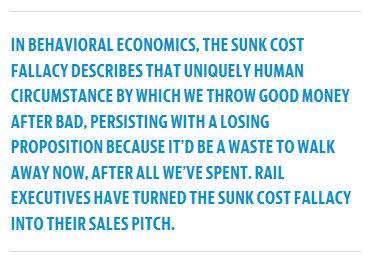 Rail executives have turned the sunk cost fallacy into their sales pitch. In a revealing interview this summer, Dan Richard, chair of the California High Speed Rail Authority, conceded that the project’s funding plan relies on it.
“By 2024, we’re going to be deep into construction. We’re going to be on the verge of opening the first service. We’ll be seeing Google and others making massiveinvestments in areas around high-speed-rail stations,” he said. “The case will be there for the importance of continued funding.” That sunk cost argument was enough to persuade the Federal Transit Administration to provide $647 million in federal grants to electrify a 51-mile stretch of Caltrain tracks that transports workers between San Jose and San Francisco. While the tech oligarchs reap the immediate benefits of improving their daily commute, the beleaguered Central Valley gets grand promises of economic revitalization. As a remedy for the Bay Area’s sky-high housing prices, rail proponents are selling a new vision of Central Valley worker bees transported via high-speed rail to the Silicon Valley. “Why not build new communities, well-designed communities, sustainable communities in the Central Valley?” asks Jim Wunderman, president and CEO of the Bay Area Council. “[Why not] have more folks live there and have an efficient and pleasant train commute into the Bay Area?” The idea that tens of thousands of workers will spend hours commuting to Silicon Valley is fiction. Tech companies don’t create jobs for the masses. When Snapchat went public last year, the $31 billion company employed fewer than 2,000 workers. Compare that to the 58,000 employees of retailer Ross Stores, or 55,000 employees of engine manufacturer Cummins, Inc., both of equivalent market capitalization. Of the few jobs created by technology companies, even fewer will take a train to the Central Valley. “Most new jobs are not near transit,” the San Francisco Bay Area Planning and Research Association concluded in its latest report. “Despite efforts by regional planners to incentivize transit-accessible locations, only 28 percent of new office development has occurred within a half-mile of regional transit.” With construction costs up and job creation down, California should bite the bullet on the bullet train boondoggle, like rats abandoning a sinking ship. The behavior, first observed by Pliny the Elder in the 1st century A.D. and later canonized by Shakespeare in The Tempest, is based on sound economic theory. New research published last month in the Journal of Behavioral Processes has found that rats behave optimally in a sunk cost task. Unlike human beings, rats aren’t emotionally invested in their past mistakes. When the ship starts to sink, they don’t worry about the resources already expended. Rats! If only California high-speed rail executives acted as rationally.

Bipartisanship: Such a nice concept, like unicorns
August 27, 2017
By The Editorial Board
Such a nice idea
“Bipartisanship” is such a sweet word, like “unicorn.” Assemblyman Chad Mayes of Yucca Valley learned all about it after voting for the cap-and-trade bill last month, and getting bounced as Assembly Republican leader last week. California Republican Party Chairman Jim Brulte, and Republican National Committee members Shawn Steel and Harmeet Dhillon sealed his fate by demanding he step down. If only the GOP could do something about its numbers. A mere 25.9 percent of California’s registered voters are Republicans, down by 300,000 registered voters since 2007. Democrats gained more than 2 million registrants during that time. Mayes promised to persist, saying in an interview that he will work to “remake the California Republican Party. I am a believer that if we don’t reshape it, we’re going to continue down the death spiral.” In an act of class, Mayes voted for his successor, Brian Dahle of Nubieber.
Read morhere: http://www.sacbee.com/opinion/editorials/article169348587.html#storylin

He rallied support for California's climate change fight. Now Chad Mayes is out as Assembly Republican leader
August 24, 2017
By Patrick McGreevy - Contact Reporter
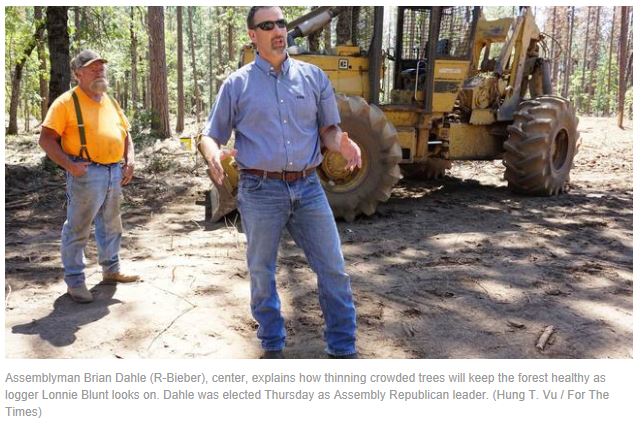 Six weeks after helping Democrats revamp California’s landmark climate change policy and facing a torrent of anger from conservative critics, the Republican leader of the state Assembly agreed Thursday to step down and allow a rural Northern California lawmaker to lead the GOP’s fractured caucus.
The shuffle, which saw Chad Mayes replaced by Assemblyman Brian Dahle (R-Bieber) as leader, comes as the California Republican Party’s numbers continue to shrink among registered voters and in elected office. Republicans make up just over a quarter of the state’s total voters, while Democrats in the last election won supermajorities in both houses of the Legislature.
The change at the top is also happening as members of the GOP are split on whether to embrace the state party's moderate image of the recent past, or move further to the right to stand with President Trump.
Rancor over Mayes’ leadership began last month, when the Yucca Valley assemblyman aligned with Democratic state lawmakers and Gov. Jerry Brown to extend the cap-and-trade program, a move made as the Trump administration withdraws from the battle against global warming. Chummy photos of a beaming Mayes sitting with Democratic leaders after the vote spread over social media, infuriating Republican activists who saw his vote as a betrayal.
Mayes’ decision to relinquish his role came after four other Republican lawmakers announced they would seek to replace him as leader of the party’s 25-member caucus. Mayes, who will stay in the Assembly, announced during Thursday morning’s floor session that Republicans voted unanimously to elect Dahle — pronounced to rhyme with “valley” — to the post.
California Legislature extends state's cap-and-trade program in rare bipartisan effort to address climate change.
Dahle, 51, who voted against the bipartisan proposal to extend cap and trade, will take over when the Legislature adjourns for the year on Sept. 15 so there can be a smooth transition, Mayes said.
Other Republicans said Dahle has the leadership and bridge-building skills to heal the rift in the party, and a willingness to sit at the table with the majority party without surrendering on conservative principles.
“He’s a gifted leader,” said Shawn Steel, a Mayes critic and one of California’s two representatives to the Republican National Committee. “He’s an effective unifier of the caucus, and we really needed that. I’m so glad the drama is over. Chad was just not the right leader at the right time.”
Mayes also praised his successor.
"I’m actually very excited about Brian taking over as Republican leader,” Mayes said, standing next to Dahle in a state Capitol hallway. “He has proven himself to be a very strong leader, somebody who is of great character, who has a heart for California and a heart for the people of his district."
Dahle, a Lassen County resident, said he is “honored and humbled” to lead the caucus, of which 10 members voted in a private meeting Monday to remove Mayes. Thirteen votes are needed to replace the leader, but the 10-vote tally signaled dissatisfaction among a large share of the caucus over the direction Mayes was taking.
“I look forward to bringing us together and moving forward,” said Dahle, who was elected to the Assembly in 2012 and is seen as more conservative than Mayes.
Mayes’ ouster was the first political consequence since the vote July 17 to extend the cap-and-trade program. Republicans are worried that others in their caucus who voted for the extension may face backlash at the polls in the next election.
Six Republican Assembly members joined Mayes in voting to extend cap and trade. Mayes said criticism of the vote from within the party played a role in his decision to step down. He decided to call an early vote when Dahle told him Wednesday night that he had more than the 13 votes — a majority of the caucus — needed to be elected.
“In looking at where we are at, there were some members of our caucus who were taking tremendous amounts of pressure from folks back at home and it seemed important that we come up with a win-win situation,” Mayes said.
Mayes had been under pressure to step down for some time. The California Republican Party’s board voted Aug. 18 to urge Mayes to step down over fallout from the cap-and-trade extension.
Many Republicans said the cap-and-trade program, which requires polluters to buy carbon emission credits, will hurt businesses and add to the cost of goods and services for consumers.
“What it really is, is a massive tax grab to support Jerry Brown’s bullet train and feel-good programs that are very expensive,” Steel said.
Assemblywoman Melissa Melendez (R-Lake Elsinore) led the criticism of Mayes, saying his vote enabled the Democrats to pass a bill that will harm the state’s economy and that would not have passed without Republican support. On Thursday, Melendez said she has “tremendous respect” for Dahle.
Assemblymen Jay Obernolte (R-Big Bear Lake) and Vince Fong (R-Bakersfield) had also announced they were challenging Mayes, but Fong said after the vote that he wants the party to end the division.
“Now is the time to unite our state and our Republican caucus in our collective fight for common-sense policies that improve the lives of everyday Californians,” Fong said in a statement.
California Politics Podcast: The winners and losers in the new cap-and-trade agreement
Dahle, a farmer and seed business owner who served on the Lassen County Board of Supervisors, acknowledged differences with Mayes on cap and trade, but said legislators have to represent the feelings of their districts.
Six weeks after helping Democrats revamp California’s landmark climate change policy and facing a torrent of anger from conservative critics, the Republican leader of the state Assembly agreed Thursday to step down and allow a rural Northern California lawmaker to lead the GOP’s fractured caucus.
The shuffle, which saw Chad Mayes replaced by Assemblyman Brian Dahle (R-Bieber) as leader, comes as the California Republican Party’s numbers continue to shrink among registered voters and in elected office. Republicans make up just over a quarter of the state’s total voters, while Democrats in the last election won supermajorities in both houses of the Legislature.
The change at the top is also happening as members of the GOP are split on whether to embrace the state party's moderate image of the recent past, or move further to the right to stand with President Trump.
Rancor over Mayes’ leadership began last month, when the Yucca Valley assemblyman aligned with Democratic state lawmakers and Gov. Jerry Brown to extend the cap-and-trade program, a move made as the Trump administration withdraws from the battle against global warming. Chummy photos of a beaming Mayes sitting with Democratic leaders after the vote spread over social media, infuriating Republican activists who saw his vote as a betrayal.
Mayes’ decision to relinquish his role came after four other Republican lawmakers announced they would seek to replace him as leader of the party’s 25-member caucus. Mayes, who will stay in the Assembly, announced during Thursday morning’s floor session that Republicans voted unanimously to elect Dahle — pronounced to rhyme with “valley” — to the post.
California Legislature extends state's cap-and-trade program in rare bipartisan effort to address climate change.
Dahle, 51, who voted against the bipartisan proposal to extend cap and trade, will take over when the Legislature adjourns for the year on Sept. 15 so there can be a smooth transition, Mayes said.
Other Republicans said Dahle has the leadership and bridge-building skills to heal the rift in the party, and a willingness to sit at the table with the majority party without surrendering on conservative principles.
“He’s a gifted leader,” said Shawn Steel, a Mayes critic and one of California’s two representatives to the Republican National Committee. “He’s an effective unifier of the caucus, and we really needed that. I’m so glad the drama is over. Chad was just not the right leader at the right time.”
Mayes also praised his successor.
"I’m actually very excited about Brian taking over as Republican leader,” Mayes said, standing next to Dahle in a state Capitol hallway. “He has proven himself to be a very strong leader, somebody who is of great character, who has a heart for California and a heart for the people of his district."
Dahle, a Lassen County resident, said he is “honored and humbled” to lead the caucus, of which 10 members voted in a private meeting Monday to remove Mayes. Thirteen votes are needed to replace the leader, but the 10-vote tally signaled dissatisfaction among a large share of the caucus over the direction Mayes was taking.
“I look forward to bringing us together and moving forward,” said Dahle, who was elected to the Assembly in 2012 and is seen as more conservative than Mayes.
Mayes’ ouster was the first political consequence since the vote July 17 to extend the cap-and-trade program. Republicans are worried that others in their caucus who voted for the extension may face backlash at the polls in the next election.
Six Republican Assembly members joined Mayes in voting to extend cap and trade. Mayes said criticism of the vote from within the party played a role in his decision to step down. He decided to call an early vote when Dahle told him Wednesday night that he had more than the 13 votes — a majority of the caucus — needed to be elected.
“In looking at where we are at, there were some members of our caucus who were taking tremendous amounts of pressure from folks back at home and it seemed important that we come up with a win-win situation,” Mayes said.
Mayes had been under pressure to step down for some time. The California Republican Party’s board voted Aug. 18 to urge Mayes to step down over fallout from the cap-and-trade extension.
Many Republicans said the cap-and-trade program, which requires polluters to buy carbon emission credits, will hurt businesses and add to the cost of goods and services for consumers.
“What it really is, is a massive tax grab to support Jerry Brown’s bullet train and feel-good programs that are very expensive,” Steel said.
Assemblywoman Melissa Melendez (R-Lake Elsinore) led the criticism of Mayes, saying his vote enabled the Democrats to pass a bill that will harm the state’s economy and that would not have passed without Republican support. On Thursday, Melendez said she has “tremendous respect” for Dahle.
Assemblymen Jay Obernolte (R-Big Bear Lake) and Vince Fong (R-Bakersfield) had also announced they were challenging Mayes, but Fong said after the vote that he wants the party to end the division.
“Now is the time to unite our state and our Republican caucus in our collective fight for common-sense policies that improve the lives of everyday Californians,” Fong said in a statement.
California Politics Podcast: The winners and losers in the new cap-and-trade agreement
Dahle, a farmer and seed business owner who served on the Lassen County Board of Supervisors, acknowledged differences with Mayes on cap and trade, but said legislators have to represent the feelings of their districts.
 “There are 24 other members of this caucus and they all have different views,” Dahle said. “There are people in our caucus who voted their conscience for their district, and I support those who did that. In my case it didn’t work in my district, so I was opposed to that.”
The leader-elect said he wants Republicans to be involved in talks with Democrats on big issues such as cap and trade.
That was part of Mayes’ thinking when he negotiated with Democrats on extending California’s signature program to address climate change. Senate President Pro Tem Kevin De León (D-Los Angeles) praised him Thursday for his “common-sense leadership.” And Brown responded to news of Mayes stepping down with a tweet: “Sad day when the Grand Old Party punishes a leader whose only flaw was believing in science & cutting [regulations], costs & taxes for Californians.”
Mayes, who has been leader since January 2016, said addressing climate change would show young voters in particular that the Republican Party was not obstructionist.
“I think for too long we’ve had a party that just wanted to be in opposition instead of wanting to be the proposition party,” Mayes said Thursday.
Dahle hails from a strongly conservative district — President Trump beat Hillary Clinton by 20 points there in the election last year — and the assemblyman’s voting record hews closely to the rightward lean of his constituents.
Harmeet K. Dhillon, a Republican party official who led the charge against Mayes, described her reaction to Thursday’s leadership change in one word: relief.
But the reverberations after the cap-and-trade vote are likely to continue, she said.
“Now, given the fact that six of these [Republican lawmakers] did vote for a massive tax increase, Republicans are going to be very vigilant about these issues,” Dhillon said.
Times staff writers Melanie Mason and Chris Megerian contributed to this report. “There are 24 other members of this caucus and they all have different views,” Dahle said. “There are people in our caucus who voted their conscience for their district, and I support those who did that. In my case it didn’t work in my district, so I was opposed to that.”
The leader-elect said he wants Republicans to be involved in talks with Democrats on big issues such as cap and trade.
That was part of Mayes’ thinking when he negotiated with Democrats on extending California’s signature program to address climate change. Senate President Pro Tem Kevin De León (D-Los Angeles) praised him Thursday for his “common-sense leadership.” And Brown responded to news of Mayes stepping down with a tweet: “Sad day when the Grand Old Party punishes a leader whose only flaw was believing in science & cutting [regulations], costs & taxes for Californians.”
Mayes, who has been leader since January 2016, said addressing climate change would show young voters in particular that the Republican Party was not obstructionist.
“I think for too long we’ve had a party that just wanted to be in opposition instead of wanting to be the proposition party,” Mayes said Thursday.
Dahle hails from a strongly conservative district — President Trump beat Hillary Clinton by 20 points there in the election last year — and the assemblyman’s voting record hews closely to the rightward lean of his constituents.
Harmeet K. Dhillon, a Republican party official who led the charge against Mayes, described her reaction to Thursday’s leadership change in one word: relief.
But the reverberations after the cap-and-trade vote are likely to continue, she said.
“Now, given the fact that six of these [Republican lawmakers] did vote for a massive tax increase, Republicans are going to be very vigilant about these issues,” Dhillon said.
Times staff writers Melanie Mason and Chris Megerian contributed to this report.

My family escaped North Korea - Trump's response was spot on
August 17, 2017
BY SUPERVISOR MICHELLE PARK STEEL, OPINION CONTRIBUTOR
08/17/17 06:20 PM EDT
After President Trump's strong response to the increased threat from North Korea, many have been quick to call the response dangerous and inflammatory. The only dangerous and inflammatory activity has come from North Korea's increasingly volatile and violent leader.
As an immigrant from South Korea whose family escaped the communist north, I refuse to support any policy or action that could lead to the appeasement of the unhinged Kim Jong-Un and his murderous government.
It is unclear why many who would acknowledge that Kim Jong-Un and his despotic leadership are dangerous and out of control would at the same time ask for the United States to concede and pursue the same policy of pay-offs and appeasement that has consistently failed for the past two decades. Not only has that policy failed - it created the crisis, which we currently face.
For the past twenty years, under both Democratic and Republican administrations, the position of the United States has been consistent with that put forward by Trump: If North Korea puts the United States at risk, the United States will react in kind. Yet, as Kim Jong-Il and his arguably less-sane son and successor, Kim Jong-Un, continued their march toward full nuclearization, previous American administrations tamped down their rhetoric as Trump is being urged to do now.
The U.S. adopted a policy of pay-offs and appeasement that cooled off rhetoric on our side, but only fanned the flames of North Korean propaganda. And worse, those policies have brought us to a point where Kim Jong-Un appears to possess deployable nuclear-tipped intercontinental-ballistic missiles.
The United States cannot and should not have a passive relationship with anyone who so boldly threatens the lives of American citizens and our allies.
Those who truly recognize the danger the North Korean regime presents cannot in good conscience suggest that our president take a passive and weak attitude towards such a real threat to not only the United States but, to our allies in the Pacific.
It is this laissez-faire attitude, which the previous administration called "strategic patience," in response to North Korea's belligerence that is to blame for the current escalation and danger to our national defense. "Strategic patience", as many have pointed out is just another way of saying, "kick the can down the road." Well, Trump isn't kicking any cans down the road.
Trump is neither the instigator nor the cause of this escalation. That blame lies with the unstable communist dictator Kim Jong-Un. I stand by and support Trump's strong resolve to protect our great nation and our allies from all threats.
Requests and outcries for a peaceful response from our president amid the growing threat are entirely misdirected. Efforts should be aimed toward the North Korean leader, whose actions threaten peace and exacerbate the possibility of nuclear warfare. His actions alone threaten the millions of innocent people living in both North and South Korea, not the United States and our president.
We must never forget the brutality of North Korea's government and lack of concern for human life. Only a few months ago, American citizen Otto Warmbier, was laid to rest after a brutal and ultimately fatal 17-month detention in North Korea. Still to this day there are three fellow Americans who are still living this nightmare.
Tony Kim, Kim Hak Song and Kim Dong Chul are all fellow Americans who are currently still detained in North Korea. Tony Kim, a teacher and humanitarian worker along with fellow teacher Kim Hak Song were arrested and the charges are still unclear. Kim Dong-chul was a business man and is currently serving a 10 year of hard labor in North Korea.
Defense Secretary James Mattis stated that the State Department will make every effort to resolve the global threat through diplomatic means. But, he has also said that North Korea "would lose any arms race of conflict it initiates," and that North Korea "should cease any consideration of actions that would lead to the end of its regime and the destruction of its people."
I don't wish for either side to escalate this increasing tension to bring global warfare that could risk the lives of innocent people. As they say, it takes two to tango and I do not believe blaming our president for the escalation in hostility between our two nations is a fair evaluation.
I stand by Trump and those who, like him in this circumstance, stand up for truth against evil.

Students at CA College Claim School Hired Investigators to “Harass” Conservatives
July 18, 2017
By Kody Fairfield
Orange Coast College (OCC) in Costa Mesa, California has become a political hot bed since the 2016 election, and the trend doesn’t appear to be ending any time soon.
Campus Reform (CR) is reporting that OCC, following pressure from left-leaning activists and faculty, has hired an “independent” off-campus investigator to do some digging into the school’s College Republican club in what is being called a “fact finding” mission to determine whether or not the club had ever violated any campus policies during its two year existence.
OCC College Republican President Emeritus Joshua Recalde-Martinez contacted Dean of Student Life and Services Mike Morvice, who is responsible for overseeing campus clubs, with his concerns following his learning about the “investigation,” reports CR.
“I was recently informed that their [sic] were complaints that have been filed against the OCC Republicans this past semester that may have manifested into some sort of investigation,” Recalde-Martinez wrote, asking Morvice for any information he could provide, reports CR.
“Outside of the initial inquires made in the Fall 2016/Intersession 2017 and OC Human Relations listening sessions from the Spring 2017, I am not familiar with any investigations involving clubs/student organizations taking place at this point in time,” Morvice replied in an email correspondence obtained by CR.

CR reports that Recalde-Martinez later emailed College President Dennis Harkins with the same question, including this time the emails between College Republican members and requests that they participate in the “investigation.” He also reminded Harkins that the Board of Trustees had previously called for an end to the investigation of a professor for her anti-Trump tirade during class.
This time, Harkins answered the question, telling Recalde-Martinez that “the investigation is in response to a discrimination case,” but that it would be “inappropriate for me to provide any additional information other to say the district often uses outside investigators for this kind of complaint,” according to CR.
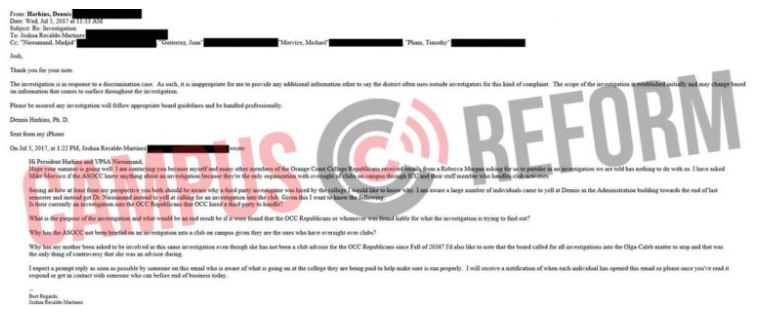
CR reports that Nora Quinn of the Quinn Law Firm, presumably the lead for the investigation, has not provided the College Republicans with a list of complaints for the club, nor has she identified the individual(s) under investigation.
“I cannot give you a list of the complaints because I’m not authorized to do so, and information continues to emerge,” Quinn told Recalde-Martinez in an email dated July 9, responding to his request for a list of the specific complaints that she is investigating, reported CR.
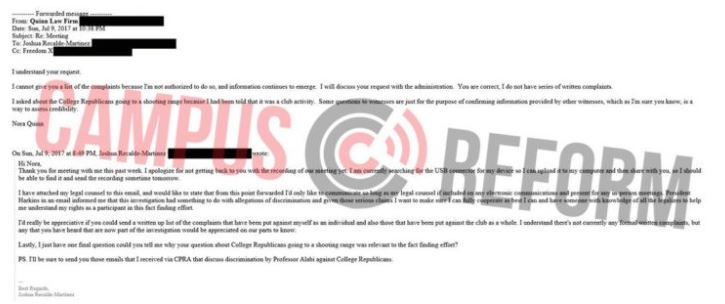
The apparent lack of transparency from OCC’s administration seems to have pressed Recalde-Martinez to the conclusion that the school is “actively working in conjunction with the faculty union and their campus agitators to silence and target conservative students at the college.” Recalde-Martinez vowed to CR that the College Republicans “will continue to fight this discriminatory behavior by the campus in any way legally possible.”
OCC’s College Republicans have retained the legal assistance of Freedom X, a public-interest law firm that defends conservatives against viewpoint discrimination, as well as the Shawn Steel Law Firm, both of which also represented the club when the school suspended CR member Caleb O’Neil for filming his professor, explained CR.
“This investigation is a waste of time and public resources drummed up by a left-wing campus administration with nothing better to do than to harass the College Republicans,” Bill Becker, chief counsel of Freedom X, told Campus Reform. “If anything were to come out of it, I would be surprised. We’re ready to initiate legal action in the event the club is punished.”
Juan Gutierrez, director of marketing and public relations at OCC, provided the following statement to Campus Reform:


Are these Republicans kidding themselves by running for California governor?
July 11, 2017
BY CHRISTOPHER CADELAGO ccadelago@sacbee.com
Republican Meg Whitman spent nearly $180 million trying to become governor of California. Picking over the wreckage of her 13-point loss to Jerry Brown, the former eBay chief executive compared the experience to a car careening into a wall.
The last time, Republican Neel Kashkari billed his campaign as a “transformational moment” for the California GOP, even spending a week posing as a homeless man in Fresno. His kamikaze effort ended in a 20-point defeat to Brown.
California Republicans were shut out of last year’s U.S. Senate runoff between Democrats Kamala Harris and Loretta Sanchez, and they haven’t won a statewide race for any office since 2006.
They had held up San Diego Mayor Kevin Faulconer as their best chance to break the curse and win a top-of-the-ticket contest, arguing that while he lacked the silver screen charisma of Arnold Schwarzenegger, the fiscally conservative and socially moderate leader of the state’s second-largest city had already proven he could win elections in deeply Democratic territory.
But with Faulconer spurning their recruitment efforts, the GOP is now looking further down its thin bench at three Southern Californians who have lined up to run in next year’s contest. Assemblyman Travis Allen, venture capitalist John Cox and former Assemblyman David Hadley each see the next governor when they look in the mirror, betting against the odds things will be different this time.
Marty Wilson, a veteran GOP strategist in Sacramento, chuckled when asked why anyone in the Republican Party would submit themselves to what will likely amount to an exercise in futility.
“That’s an existential question,” said Wilson, who advised former Republican governors, including Schwarzenegger. “I suggest you talk to a priest or rabbi, because that’s beyond my pay grade.”

Still, Wilson said if he could wave a proverbial magic wand, creating a pile of cash for the ideal Republican, he believes there’s an opportunity to capitalize on issues facing the state for a fiscally prudent candidate, somebody who could argue that “we can’t solve the state’s problems by raising more taxes,” but who isn’t particularly hardline on social issues.
The GOP candidates themselves offer plenty of reasons why they will break through: Jerry Brown isn’t running. Democrats are in danger of going so far left that voters will rebel. Democrats, they say, have proven themselves unable to solve intractable problems such as high poverty, soaring housing costs and poorly performing schools. And so many Democrats are running that Republicans argue they have a sufficient chance of escaping the June 2018 primary, in which the top two vote-getters regardless of party advance.
Among Democrats, Lt. Gov. Gavin Newsom leads the race in fundraising and has maintained an advantage in every public poll. Others include state Treasurer John Chiang, former Los Angeles Mayor Antonio Villaraigosa and former state schools chief Delaine Eastin. Republicans must avoid splitting up their smaller share of the vote and allowing two of the Democrats to make the runoff.
“From the Republican perspective, if you could just get to November, you’ve got a prayer,” said Brian Brokaw, a Democratic consultant in Sacramento. “But it isn’t much more than that.”
A key for each of the little-known GOP challengers is to raise enough money to pay for at least six weeks of TV ads ahead of the June primary. But they will have to overcome what has long been their biggest anchor in California: the Republican Party label.
They also will be made to answer to every position, statement and tweet issued by President Donald Trump, who lost California by more than 4 million votes. GOP analysts contend they’ll be able to survive the potential Trump-fueled setbacks because Democrats are being pushed further to the left than statewide voters are comfortable with.

“Progressives are wearing out their welcome,” said Shawn Steel, a Republican National Committeeman from Orange County.
“I think every Republican prays that it’s Newsom,” Steel said, referring to the leading Democrat as an “oddball” and a “pro-big government extremist.” “I don’t think he’d sell as well.”
Steel pointed to Brown and Democrats using their supermajority status to muscle though a 10-year, $52 billion increase in gas taxes and vehicle fees to pay for road repairs and transit projects.
“Unlike any other taxes, that pisses off motorists,” Steel said. “That hits the poor and the middle class right between the eyes because they have to buy gas.”
Allen, a conservative lawmaker and financial planner from Huntington Beach, has made repeal of the “gas tax” the centerpiece of his gubernatorial campaign.
“There is a silent supermajority in California that has been marginalized and feels entirely unrepresented by Jerry Brown and the California Democrats,” Allen, 43, said in a recent interview.
He said the tax “has galvanized ordinary Californians up and down the state and given them a new hope that they can once again take control of the state and have their voices heard in Sacramento.”
Allen voted for Trump after initially supporting Sens. Marco Rubio of Florida and then Ted Cruz of Texas, and believes the early months of his presidency have lifted the spirits of the country.
“There is a new sense of optimism that’s attributable to the change in presidency. (Trump’s) message for making the U.S. the strongest nation in the world was extremely compelling,” Allen said, adding, “California is the largest state in the nation, and having friendly relations with the White House is a very good thing for the citizens.”
Hadley, a 52-year-old self-described “servant leader” viewed as a moderate during his two years in the Legislature, didn’t support Trump and voted for libertarian Gary Johnson.
But the Manhattan Beach resident who started an investment banking firm said he won’t allow Democrats to use Trump as a distraction from their poor record of addressing festering problems with poverty, schools, high taxes and public services more generally while controlling the Legislature for much of the past 50 years.
“They don’t want to talk about those things,” Hadley said, predicting, “this is going to be one long exercise in polarization. But I am not going to climb down the rabbit hole of chasing every stray media outrage that comes down the pike.”
Billing himself as the only Republican who can “unite the center right,” and win in November, Hadley noted that the GOP will be aided by not having to face Brown for the first time in eight years, offering slight praise for Brown’s relative fiscal restraint and growing budget reserves for rainy days.
“California has looked more Democratic than it is in part because Gov. Brown is a better Democratic governor than the Democratic party deserves,” he said. “He’s been a historic figure with a 50-year career; (and) is very much his own brand. He’s more independent intellectually.”
The next crop of California Democrats, in contrast, is “a generation of socialists,” Hadley argues, pointing to the Senate advancing a universal health care bill to virtually abolish the private market.
“This is not moderate Democrats versus cranky, out-of-touch Republicans,” he said. Rising Democrats “have a far more radical and far more leftist view of what the state should be doing.”
Cox, an investor and attorney who relocated to Rancho Santa Fe from Illinois, dismissed his opponents as standard politicians who are running because they’ve grown tired of “beating their heads against the wall” in the Democratic-run Legislature. Cox seeded his campaign with $3 million of his own money and raised just over $200,000 more.
“I joked with my guys today that maybe every assemblyman will announce for governor,” said Cox, 61, who briefly flirted with a quixotic presidential run in 2008, earning distinction from the Weekly Standard as the “sane fringe candidate.”
Cox thinks of himself as “a businessman governor who knows how to meet a budget.” He criticized other blue states facing budget woes and worries California is headed there again, soon. “I’m business-, taxpayer- and people-friendly – as opposed to special interest-friendly.”
He’s staking his run on a recurring proposed ballot measure to create what he calls a Neighborhood Legislature, generating scores of elected representatives to advise lawmakers. While Cox has offered mix views on Trump’s policies, he portrays the president as a non-factor for voters looking for a new direction here.
“We have had eight years of Jerry Brown acting as a check on the Legislature,” Cox said. “Mr. Brown has also failed to address the issues, making them worse. Californians are looking for answers that involve private-sector solutions. And I strongly doubt the four Democrats in this race will change that direction.”
“I am not doing this for ego. I am not doing this for a job,” he added. “I am doing this because this state has to change its direction or we will end up like New Jersey, Illinois and Connecticut.”
With emerging from the primary as their chief concern, the scrambled field could make it difficult for any of the three Republicans to occupy the center, said Jason Roe, a GOP consultant.
Roe expects Chiang and Villaraigosa to fight for middle-of-the-road voters, leaving the Republicans in a battle for the right. Concluded Roe: “That will make it harder.”
Christopher Cadelago: 916-326-5538, @ccadelago
House Passes Bill on Illegal Immigration, Sanctuary Cities
June 29, 2017

GOP Leader: Europeans Need Reality Check
May 30, 2017
President Trump is back from Europe. It’s now apparent he ticked off German Chancellor Angela Merkel and some other European leaders. Shawn Steel, the California National Committeemen for the RNC, says the Germans should not be complaining about Americans not doing their part for European security and trade. “The Germans are the ones who like to tell the rest of Europe that open borders is a great thing, and don’t worry about the few bad apples. They’re the ones that are basically dominating Europe in kind of an ugly way, and they’re the ones that are only paying half their defense bill! So they always count on the Americans. You know, we still have a lot of American soldiers stationed in Germany. Lots of equipment. We are the ones that are really furnishing the great defense for Europe, and I don’t recall a ‘Thank You’ in the last couple of decades from the Germans or anyone else in Europe!” Steel says the Germans and other European leaders don’t seem to be aware of their own shortcomings. “They’re arrogant, they have high unemployment for their youth, they have sputtering economies, now they have a huge problem with a cultural invasion that they’ve created themselves, and they pretend there’s no problem here! Trump tells them the truth, and they’re offended. And you know what? They need to be offended.” Shawn Steel was a guest on McIntyre in the Morning. www.SteelZone.org By Sandy Wells

Left- & ACLU-Supporting Lawyer Said to Be Top Sessions Choice for Civil Rights
March 14, 2017
(Quin Hillyer, Liberty Headlines) While liberals continue to push the narrative that Attorney General Jeff Sessions is too conservative for his position, a behind-the-scenes argument is brewing on the right about whether the rest of Sessions’s Justice Department will be conservative enough.
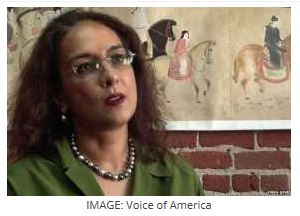 The biggest disagreement among conservative legal eagles involves Sessions’s pending choice to lead the department’s most controversial sub-department, the Civil Rights Division. The widely reported front-runner for the spot, California Republican leader Harmeet Dhillon, counts conservative superstars Laura Ingraham and (reportedly) Dinesh D’Souza among her staunchest supporters. However, plenty of other conservative stalwarts argue that Dillon is too liberal for the appointment. Dillon was an ally of Ingraham and D’Souza three decades ago when they all worked on the conservative Dartmouth Review and pilloried the liberal college administration. She also has been active in the Federalist Society, the national organization of conservative and libertarian lawyers, and she helped lead the Trump campaign’s effort to massage the rules in his favor at last year’s Republican National Convention. On the other hand, since her college and law school days. Dhillon has served as a board member of the San Francisco chapter of the liberal American Civil Liberties Union, and has spoken in favor of liberal pro-abortion laws and in favor of recognizing more American legal rights for enemy combatants held at Guantanamo Bay. She also donated to the campaign of California’s left-wing U.S. Sen. Kamala Harris, when Harris ran for her earlier position of San Francisco District Attorney. For those reasons and others, Paul Mirengoff of the well-known conservative blog Powerline has written two columns opposing Dhillon’s selection to head the Civil Rights Division. “The Civil Rights Division must be headed by a staunch conservative,” Mirengoff wrote in the first one. “It simply won’t do for a former ACLU board member and Kamala Harris supporter with an obvious liberal streak to head the Division.” In answer to that first column and other criticisms, Dhillon’s fellow Republican National Committee member from California, Shawn Steel, circulated a letter defending her conservative bona fides and belittling many of her critics as “holdovers from the Bush era” and characterizing the criticism of her as “smears.” Noting that Dhillon is a Sikh, he wrote that “in the California central valley, Sikhs are among our greatest allies. They are quite conservative and fiercely proud Americans.” None of which, retorted Mirengoff, excuses the record indicating that “ideologically, she has played for both teams.” Separately – and without mentioning Dhillon directly – some top conservative lawyers are circulating their own letter addressed to Sessions that stresses the importance of choosing a constitutional conservative to head the Civil Rights Division. It lists the division’s lengthy recent record of court citations for unethical behavior, accuses the division in recent years of “ideological rot,” and calls for a number of “strategic shifts” and “internal reforms.” The draft version of the letter (which hasn’t been sent to Sessions yet) urges support for voter-identification requirements and other means of ensuring the integrity of the voting process, while calling for race-neutral enforcement of civil rights laws. The latter issue refers to one of the biggest controversies in the early years of the Obama administration; one originally brought to the fore by the Obama Justice Department’s decision to drop charges in what effectively was an already-won case against two New Black Panthers accused of intimidating voters outside a Philadelphia polling place. In the wake of that case, Justice Department employees reported that the Obama team had openly stated it would not apply civil rights laws in defense of white people victimized by black perpetrators, and would not enforce voter-integrity provisions in federal law because such laws don’t advance their goal of “ increasing turnout.” Those are just a few examples of the numerous times that the Justice Department and its Civil Rights Division came under fire in each of the past two presidencies – the Obama team criticized from the political right; the George W. Bush team blasted by the left. For those reasons and others, Mirengoff’s Powerline colleague John Hinderaker weighed in over the weekend with his own column entitled “Memo to Jeff Sessions: It’s time to clean house.” Hinderaker’s conclusion explains the sentiments so widely held on the right that both sides of the divide over Harmeet Dhillon almost certainly agree: 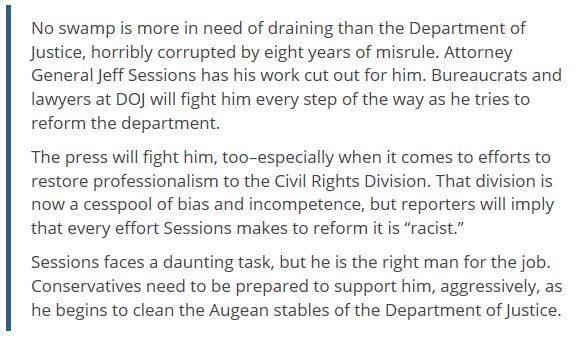 Feelings obviously run high on these issues. The Wall Street Journal last year accused the Obama Administration of running “ The Miscarriage of Justice Department,” and conservatives of all stripes don’t want Jeff Sessions’s tenure to be stillborn.

Sikh-American, Female Attorney Could Be Change Agent DOJ Needs
March 13, 2017
Sessions considers D.C. outsider, California conservative to clean up Civil Rights Division by Jim Stinson
Attorney General Jeff Sessions is considering Harmeet Dhillon, a San Francisco-based attorney and a Sikh, to lead the Justice Department Civil Rights Division.
Dhillon, 48, is a veteran litigator and national committeewoman of the California Republican Party. She was previously vice chairman of the California GOP for three years. She opened the second night of the Republican National Convention in July by delivering a Sikh prayer in Punjabi, according to the Sacramento Bee. The Sikh prayer was a first for the RNC.
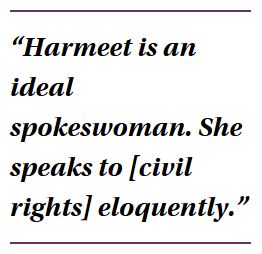
Later that same evening, then-Sen. Sessions (R-Ala.) formally nominated Donald Trump to be the Republican candidate for president.
Dhillon met with Sessions about the position last week. But well-connected attorneys from the past administration of President George W. Bush are also murmured to be jockeying for the job.
Dhillon’s advantage may be her outsider status — a quality Trump brought to the White House. The very fact Dhillon is not a product of the GOP Establishment in Washington may bolster her credibility as a would-be change agent at one of the the Department of Justice’s most wayward divisions.
But first she has to get past critics from on the Left — and a few on the Right.
Paul Mirengoff, like Dhillon an attorney and alumni of Dartmouth College, went so far as to call her a “dangerous candidate,” in a post on the conservative PowerLine blog. Mirengoff said the Civil Rights Division has become “ground zero in the fight over the Black Lives Matter agenda, including police practices, voting issues, and racial quotas” and is worried about some of Dhillon’s past associations.
Dhillon was a member of her local chapter of the ACLU for two years, an organization often in conflict with many conservative causes. In an exclusive interview with LifeZette, Dhillon said she joined the ACLU to help the Sikh community in the aftermath of the attacks of Sept. 11. Some individuals targeted Sikhs, mistakenly assuming they could be terrorists.
Jim Brulte, the chairman of the California Republican Party, said Dhillon came to the assistance of her community.
“That’s just the right thing to do,” said Brulte.
Brulte, the state legislature’s former Senate minority leader, dismissed any concern about Dhillon’s conservatism.
“She’s a conservative in a city in California where’s it not impossible to be conservative, but pretty darn hard to be a conservative,” said Brulte.
Dhillon makes no apologies for fighting hate crimes, and it’s easy to understand why. In 1995, her then-husband, a Sikh doctor, was shot in the chest in New York City by an assailant who mistook him for a Hindu. He survived, but the wound took a year out of his career.
“I am a victim of hate crimes,” said Dhillon. “Hate crimes are a real thing for the Sikh community.”
But as the former president of the Federalist Society at the University of Virginia School of Law, Dhillon said she is a true conservative.
“I think it’s laughable for anyone to challenge my conservative bona fides,” she said.
Dhillon graduated from Dartmouth College in 1989, where she edited the conservative Dartmouth Review. She received her law degree from the University of Virginia School of Law in 1993. She was born in Chandigarh, in northern India. Her family first moved to England, then New York City, then North Carolina.
“I’ve known her for 30 years — from Dartmouth College to University of Virginia School of Law,” said LifeZette Editor-in-Chief Laura Ingraham, “She is not only a fearless conservative, she is unfailingly fair-minded. When others are seeking to blur the meaning of the Constitution to expand government power, she will stand on the side of individual liberty.”
“As the founder of her own law firm, she is a successful female entrepreneur who supported Donald Trump long before it was fashionable,” Ingraham added.
Dhillon told LifeZette she thinks conservatives could do a better job of understanding civil rights laws and invoking them when applicable. Dhillon is currently suing the city of San Jose for a notorious anti-Trump protest at a June 2 campaign rally.
More than a dozen Trump supporters contend that San Jose police officers did not protect them from violent, egg-hurling protesters after the rally, according to the Bee.
An image of a female Trump supporter getting pelted by eggs went viral. Dhillon, who was at the rally, took up the case pro bono.
“People were bloodied,” said Dhillon. “A teenager was sucker-punched.”
One supporter says Dhillon is the right change agent for Trump because the last great civil rights attorneys from the GOP came from the administration of President Ronald Reagan. Shawn Steel, the California Republican national committeeman, said what the nation and the Trump administration need now is a “transformational figure” in the next few years.
“Harmeet is an ideal spokeswoman,” said Steel. “She speaks to [civil rights] eloquently.”

Orange County’s conservative students under attack
February 22, 2017
By JOSHUA RECALDE-MARTINEZ, CALEB O'NEIL and SHAWN STEEL / Contributing writers
An emerging sinister force is suppressing free speech throughout American universities. Conservative students are under attack. Now a dark cloud hovers over Orange Coast College. OCC suspended 19-year-old student Caleb O’Neil for video recording outrageous, inflammatory, hateful statements against President Trump made by Olga Perez Stable Cox, a sex education teacher. The free speech movement started at the University of California, Berkeley in 1963. The recent riots at UC Berkeley represent a retrograde approach for the university, which is now embracing opposing speech by violent means. Faculty members joined with street fighters to shut down Milo Yiannopoulos, who happens to be a gay, Jewish, British conservative. It began in the 1960s. The ruthless left-wing Students for a Democratic Society and affiliates hated contrary free speech and created the politically correct culture. The university evolved from free speech to “correct speech.” A student cannot say things that would offend anyone on the left. Yesterday’s SDS members are today’s faculty.
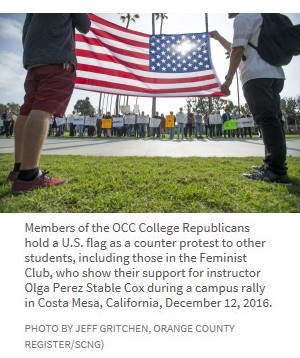 Just as their ideological heroes — Cuba, Vietnam and Communist China — regularly control dissenting views, at OCC, the ruthless union faculty leaders are actively demanding that the administration suspend Caleb and instructing anyone else to stay away from the offending instructor. Perez was caught on video in one of her three classes stating that Trump is a “white supremacist,” and that voting for Trump was an “act of terrorism.” Student Caleb O’Neil was shocked with what Perez was saying about Trump following the election. He captured Perez’s inflammatory comments on his video camera. Little did Caleb know that he would face a two-semester-long suspension from the campus. The three of us — Caleb, OCC College Republicans President Joshua Recalde-Martinez and Shawn Steel, serving as their attorney — met with Orange Coast College President Dennis Harkins a week after the incident. We asked what action Harkins would take against the inflammatory statements made by Olga Perez. Harkins offered no clarity. After Harkins refused to take action, the video was posted and viewed by more than a million people all over the world. The faculty union struck back, demanding that, instead of Perez being punished, the student be expelled. Soon after, the administration expanded its witch hunt by going after three more College Republican leaders for broadcasting the video. Then the administration also targeted College Republicans President Joshua Recalde-Martinez’s mother, who works at the school, because she was a co-adviser of the club. Edwina Recalde is the sole support of four teenage children, including Joshua. The left will stop at nothing, using Saul Alinski’s tactics to identify, trash and destroy its enemies. OCC should be embarrassed and ashamed of what it’s doing to its own students, and to the taxpayers who support the school. Fortunately, attorney Bill Becker of the Freedom X nonprofit law firm is stepping in to lead Caleb O’Neil’s appeal. If necessary, Becker will file a federal civil rights lawsuit against the administrators and faculty union leaders if they continue persecuting Caleb O’Neil. The movement to reassert free speech rights begins in Orange County. We hope a new free speech movement can spread into the dark recesses of universities in America. Right now, we demand that OCC leave Caleb alone. Joshua Recalde-Martinez is a former president of the OCC College Republicans. Caleb O’Neil is a member of OCC College Republicans. Shawn Steel is a pro bono attorney for the OCC College Republicans.
|
Articles
2025
2024
2023
2022
2021
2020
2019
2018
2017
2016
2015
2014
2013
2012
2011
2010
2009
2008
2007
2006
2005
2004
2003
2002
2000
1998
1996
|